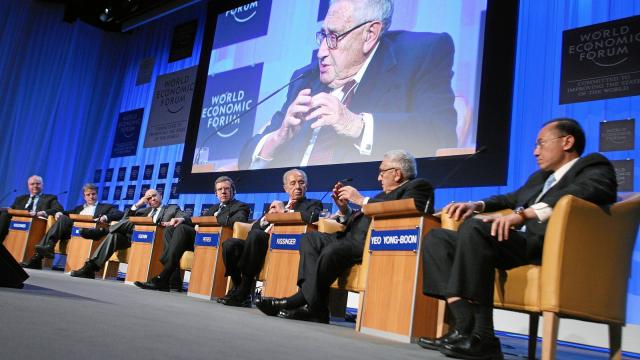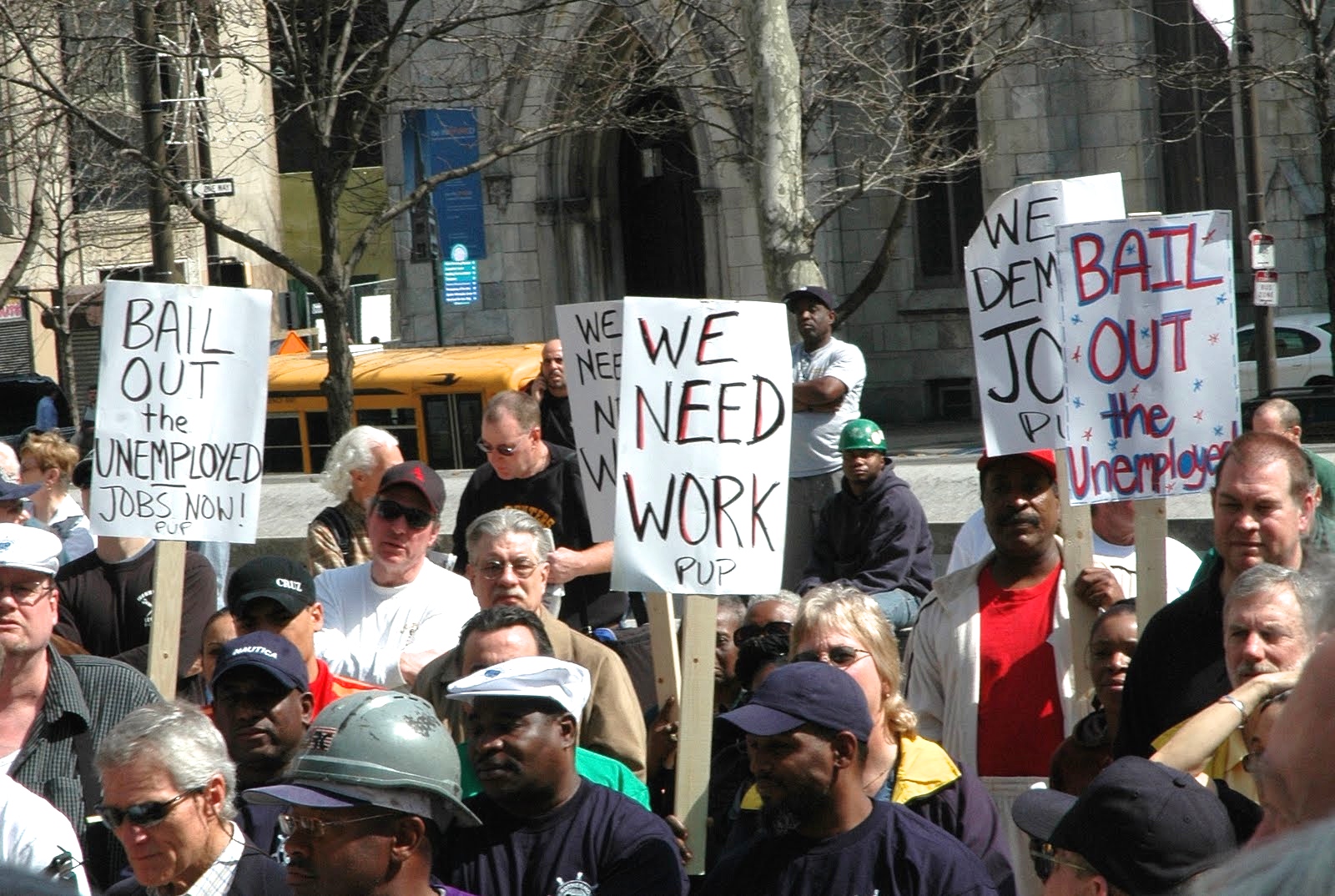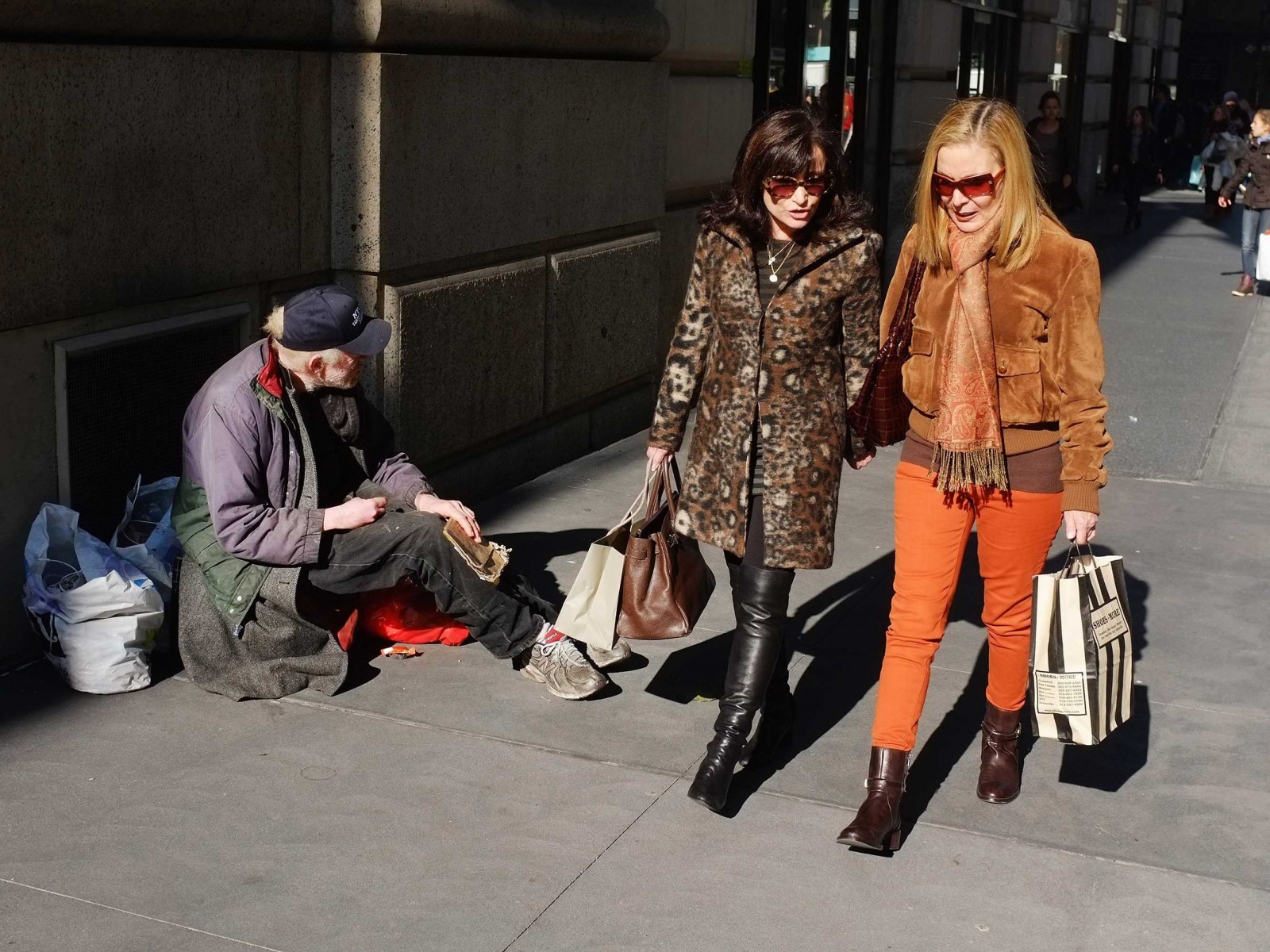
In Part 1 of the WoR Report, I examined the “global political awakening” as articulated by arch-imperial strategist Zbigniew Brzezinski. In Part 2 published last week I took a more detailed look at the ways global inequality and injustice relate to the coming era of instability and social unrest. Here, in Part 3, I explore the warnings on inequality and revolt now coming from one of the premier institutions of the global oligarchy: the World Economic Forum.
As an annual gathering of thousands of leading financial, corporate, political and social oligarchs in Davos, Switzerland, the World Economic Forum (WEF) has taken a keen interest in recent years discussing the potential for social upheaval as a result of mass inequality and poverty. A WEF report released in November of 2013 warned that a “lost generation” of unemployed youth in Europe could potentially pull the Eurozone apart. One of the report's authors, the CEO of Infosys, commented that “unless we address chronic joblessness we will see an escalation in social unrest,” noting that youth especially “need to be productively employed, or we will witness rising crime rates, stagnating economies and the deterioration of our social fabric.” The report added: “A generation that starts its career in complete hopelessness will be more prone to populist politics and will lack the fundamental skills that one develops early on in their career.”
In short, if the global ruling class – known affectionately as the Davos Class – doesn't quickly find ways to accommodate the continent's increasingly unemployed and “lost” youth, those people will potentially turn to “populist politics” of resistance that directly challenge the global political and economic order. For the individuals and interests represented at the World Social Forum, this poses a monumental and, increasingly, an existential threat.
The World Economic Forum’s Global Competitiveness Report for 2013-2014, entitled “Assessing the Sustainable Competitiveness of Nations,” noted that the global financial crisis and its aftermath “brought social tensions to light” as economic growth was not translated into positive benefits for much or most of the planet's population. Citing the Arab Spring, growing unemployment in Western economies and increasing income inequality, there was growing recognition that dangerous upheaval could be on the way. The report noted: “Diminishing economic prospects, sometimes combined with demand for more political participation, have also sparked protests in several countries including, for example, the recent events in Brazil and Turkey.”
The WEF report wrote that “if economic benefits are perceived to be unevenly redistributed within a society,” this could frequently result in “riots or social discontent” such as the Arab Spring revolts, protests in Brazil, the Occupy Wall Street movement, and other recent examples. The report concluded that numerous nations were at especially high risk of social unrest, including China, Indonesia, Turkey, South Africa, Brazil, India, Peru and Russia, among others.
In early 2014, the World Economic Forum released the 9th edition of its Global Risks report, published to inform the debate, discussion and planning of attendees and guests at the annual WEF meeting in Davos. The report was produced with the active cooperation of major universities and financial corporations, including Marsh & McLennan Companies, Swiss Re, Zurich Insurance Group, National University of Singapore, University of Oxford, and the University of Pennsylvania’s Wharton Risk Management and Decision Processes Center. It included a large survey conducted in an effort to assess the major perceived risks to the global order atop which the Davos Class sits.
The report noted that the “most interconnected” risks were fiscal crises, structural unemployment and underemployment, all of which link to “rising income inequality and political and social instability.” The young generation now coming of age globally, noted the WEF, “faces high unemployment and precarious job situations, hampering their efforts to build a future and raising the risk of social unrest.” This “lost generation” faces not only high unemployment and underemployment, but also major educational challenges since “traditional higher education is ever more expensive and its payoff more doubtful.”
Perceiving the innovations and skills of today's generation which are enabling the growing foment, the Forum noted:
"In general, the mentality of this generation is realistic, adaptive and versatile. Smart technology and social media provide new ways to quickly connect, build communities, voice opinion and exert political pressure... [youth are] full of ambition to make the world a better place, yet feel disconnected from traditional politics and government – a combination which presents both a challenge and an opportunity in addressing global risks."
The Global Risks 2014 report cited a global opinion survey on the “awareness, priorities and values of global youth,” which the authors refer to as “generation lost.” This generation, noted the survey, “think independently of this basic fallback system of the older generation – governments providing a safety net,” which “points to a wider distrust of authorities and institutions.” The “mindset” of today's youth has been additionally shaped by the repercussions and apparent failures to deal with the global financial crisis, as well as increasing revelations about U.S. intelligence agencies engaging in massive digital spying. For a generation largely mobilized through social media, online spying has held particular relevance, as “the digital revolution gave them unprecedented access to knowledge and information worldwide.”
Protests and anti-austerity movements were able to “give voice to an increasing distrust in current socio-economic and political systems,” with youth making up significant portions of “the general disappointment felt in many nations with regional and global governance bodies such as the EU and the International Monetary Fund.” The youth “place less importance on traditionally organized political parties and leadership,” which creates a major “challenge for those in positions of authority in existing institutions” as they try “to find ways to engage the young generation,” adds the report.
According to the World Bank, more than 25% of the world’s youth, or some 300 million people, “have no productive work.” On top of this, “an unprecedented demographic ‘youth bulge’ is bringing more than 120 million new young people on to the job market each year, mostly in the developing world.” This fact “threatens to halt economic progress, creating a vicious cycle of less economic activity and more unemployment,” which “raises the risk of social unrest by creating a disaffected ‘lost generation’ who are vulnerable to being sucked into criminal or extremist movements.”
Noting that more than 1 billion people currently live in slums – a number that has been steadily increasing as income inequality rises – the report stated that “this growing population of urban poor is vulnerable to rising food prices and economic crises, posing significant risks of chronic social instability.” Growing income inequality is now being termed a “systemic risk,” according to the WEF. And in a stark admission from that institution representing the world’s major profiteers of global capitalism, the report acknowledged that globalization “has been associated with rising inequality between and within countries” and that “these factors render poor people and poor countries vulnerable to systemic risks.”
The four major “emerging market” BRIC nations of Brazil, Russia, India and China “now rank among the 10 largest economies worldwide.” But slow political reforms within these countries, coupled with external economic shocks (like financial crises caused by Western nations and their corporate institutions) could aggravate the “existing undertones of social unrest.” Within the BRIC nations and other emerging market economies, “popular discontent with the status quo is already apparent among rising middle classes, digitally connected youths and marginalized groups,” the report went on. Collectively, these groups “want better services (such as healthcare), infrastructure, employment and working conditions,” as well as “greater accountability of public officials, better protected civil liberties and more equitable judicial systems.” Further, a “greater public awareness of widespread corruption have sharpened popular complaints.”
Both Brazil and Turkey have made universal healthcare systems a constitutional obligation, which was a stated ambition of other emerging market nations such as India, Indonesia and South Africa. The failure to create these healthcare systems “may arouse social unrest,” warned the WEF. The World Economic Forum’s chief economist, Jennifer Blanke, stated: “The message from the Arab Spring, and from countries such as Brazil and South Africa is that people are not going to stand for it any more.” David Cole, the group chief risk officer of Swiss Re (one of the contributing companies to the WEF report) commented: “The members of generation lost are not lost because they have tuned out. They are highly tuned in. They are lost because they are being left out or they are deciding to leave.” http://www.theguardian.com/business/2014/jan/16/income-gap-biggest-risk-global-community-world-economic-forum
The World Economic Forum’s Risk report for 2014 was primarily concerned with “the breakdown of social structures” and “the decline of trust in institutions.” It warned of risks of “ideological polarization, extremism – in particular those of a religious or political nature – and intra-state conflicts such as civil wars.” All of these issues relate directly “to the future of the youth.”
It’s an interesting paradox for an organization to see the greatest threat to its ideological and social power being “the future of the youth” when it has already written off the present generation as “lost.” However, this is a view shared not only by the World Economic Forum but, increasingly, by other powerful institutions creating something of an echo chamber through the mainstream media. The head of the IMF has warned that youth unemployment in poor nations was “a kind of time bomb,” and the head of the International Labor Organization (ILO) warned in 2011 that the “world economy” was unable “to secure a future for all youth,” thus undermining “families, social cohesion and the credibility of policies.” While there was “already revolution in the air in some countries,” as reported in the Globe and Mail, the dual crises of unemployment and poverty were “fuel for the fire.”
In April of 2014, the World Economic Forum on Latin America reported that the primary challenge for the region was “to reduce inequality,” noting that between 70 and 90 million people in Latin America had entered what were referred to as the "consuming classes," or "middle classes," over the previous decade. However, Marcelo Cortes Neri, Brazil’s Minister of Strategic Affairs, explained, “When we talk about middle class we think of the U.S. middle class, with two cars and two dogs and a swimming pool. That is not Latin American middle class or the world middle class.”
He added that the emerging so-called "middle class" in Latin America and elsewhere “could become a problem for governance,” commenting: “They are the ones that put pressure for better levels of education and healthcare; they are the ones that go to the streets to demand rights.” Neri then posed the question: “How prepared is Latin America to have a robust middle class?” In particular, youth between the ages of 15 and 29 raised specific concerns for Latin America’s elite, with Neri warning: “This is the group I am most worried about. They have very high expectations and so the probability they will get frustrated is enormous.”
When one of the world’s most influential organizations representing the collective interests of the global oligarchy openly acknowledges that globalization has increased inequality, and in turn, that inequality is fueling social unrest around the world manifesting the greatest potential threat to those oligarchic interests, we can safely say we're entering a new era of global instability and resistance.
Andrew Gavin Marshall is a researcher and writer based in Montreal, Canada. He is project manager of The People’s Book Project, chair of the geopolitics division of The Hampton Institute, research director for Occupy.com’s Global Power Project and World of Resistance Report, and host of a weekly podcast show with BoilingFrogsPost.
3 WAYS TO SHOW YOUR SUPPORT
- Log in to post comments















